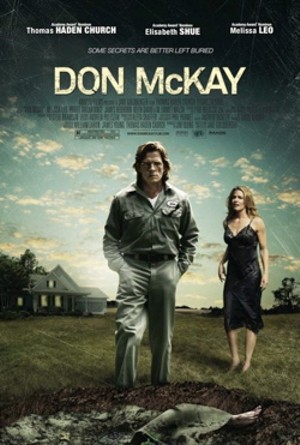Low Motive: Thomas Haden Church Goes Dark

Low Motive
Thomas Haden Church Goes Dark
Don McKay (584 words) (Two Stars)
By Cole Smithey
More a black comedy than the intended "neo-noir" that newbie auteur Jake Goldberger aspires to, "Don McKay" is a droll little independent flick for audiences with dark tastes. Thomas Haden Church is commanding as the poker faced title character who takes time away from his job as a high school janitor to reconnect with his childhood sweetheart Sonny (Elizabeth Shue) in their hometown. Sonny is allegedly dying of cancer when Don shows up at her rural home where Sonny's strict nurse Marie (Melissa Leo) keeps a close eye on Don. With a femme fatale glint in her eye Sonny wants to marry Don before she expires, but Sonny's doctor (James Rebhorn) doesn't cotton much to the couple's intimate acquaintance. One sudden murder leads to an unraveling of lies and promises that almost come together in one neatly packaged puzzle. The performances rise above the material in this roughly hewn debut experiment by a filmmaker who still needs to master the form of his chosen genre before he steps behind the camera again.
There's a line of thought in screenwriting that it takes about 25 scripts for a screenwriter to master his or her craft. Jake Goldberger liberally sites the Coen Brothers' "Blood Simple" as the "slowly paced little film noir" that inspired him to write "Don McKay." Already, we start to see the holes in Goldberger's thinking. Where he views the Coen Brothers' 1984 suspense masterpiece as "slow" and "little," I would proffer that it is confident and methodical--two key ingredients missing from "Don McKay." Goldberger also sites Billy Wilder, Alfred Hitchcock, David Mamet, and even Douglas Sirk as influential touchstones, completely missing the enormous depths that each of these filmmakers went to in preparing each of their films. In his impatience at attempting what it took those masters years to develop, Goldberg rushes into and through scenes without giving proper attention to building character, plot, and theme lines within the necessary win-or-lose constraints of dramatic narrative structure.
That said, Jake Goldberger gets very lucky for a first-timer. Casting M. Emmet Walsh ("Blood Simple") as the taxi driver who brings Don to Sonny's house, and later gets hustled into the film's rushed climax, gives the story an illusion of noir atmosphere. That Goldberger doesn't know what to do with such a gift comes with diminished rewards, but by then you're already happily seduced by Walsh's effortless ability to create a sense of off-kilter humor and subtle menace even if it never pays off.
By far, it's Thomas Haden Church--executive producer on the film--who compensates most for the film's numerous narrative shortcomings. The same actor who elevated Alexander Payne's "Sideways" (2004) to comedy of sublime proportions, here exerts an ingrained seriousness for his hapless character to fill the narrative void with palpable interest and curiosity. "Don McKay" is a drama about a lonely man who carries a terrible mistake he made as a teenager with him through every minute of his daily existence. It's a condition that makes him involuntarily unable to avoid certain emotionally baited traps regardless of how poorly they're laid. Herein lies the opportunity for dark humor and imminent bloodletting that such a diabolical plan would allow. If "Don McKay" is an overly simple plan, it is at least a dramatic vacuum filled by an actor capable of making you want him to prevail regardless of his character's lowly motivations.
Rated R. 87 mins. (C) (Two Stars)






